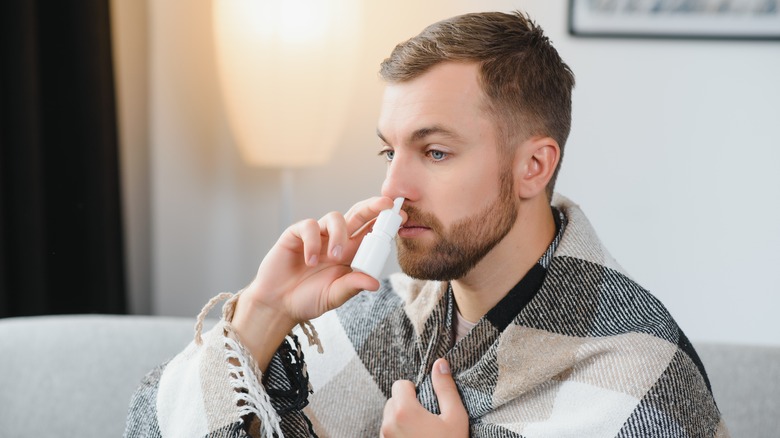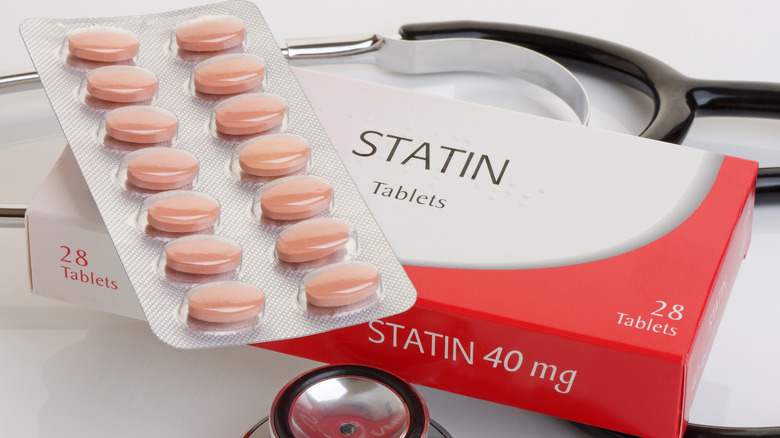Exercising Can Be Dangerous If You Take These Medications
No matter how old you are, a regular exercise routine is paramount for good health. According to the National Health Service, exercising regularly can lower one's risk of type 2 diabetes and colon cancer by 50%. In addition, staying physically active can lead to a 30% lower risk of developing depression and dementia and dying early.
However, for all of the many health benefits of exercise, people who are on certain medications have to be cautious when getting physical. A 2004 study published in Sports Medicine showed that exercise can have certain effects on how some medications interact with the body. For example, diabetic patients who had an insulin injection into a muscle could experience a higher risk of hypoglycemia when exercising that muscle group. This doesn't mean that you should refrain from exercising, though. It just means that because of these types of risks, it's important to take into account what medications you're taking before exercising.
If you're on these medications, work with your doctor to determine what the best exercise routine is for you.
Decongestants
When you're under the weather, you can be forgiven if you decide to take a few days off from exercising. However, if you just can't keep yourself from hitting the gym, you should be aware of the effects your cold medication may be having. According to UCI Health, medications such as Sudafed and Afrin can affect your blood vessels and make it more difficult for your body to regulate heat and keep cool.
Additionally, nasal decongestants that contain pseudoephedrine could raise your blood pressure, according to Harvard Medical School. Use of this drug has been linked to heart attacks, strokes, and disruptions in the heart rhythm. ACE Fitness notes that this increase in blood pressure, as well as heart rate, can make patients feel like they are working harder, thereby getting tired more quickly. In addition, for patients who may have a heart problem that they are unaware of, working out with a higher blood pressure and heart rate could trigger a cardiac event.
Sleeping pills
While most people hopefully wouldn't consider taking such sleep aids as Ambien or Lunesta prior to a workout, you could still experience a "hangover" effect the next morning (via GoodRx Health). This could make you feel groggy and drowsy during a morning workout and impact your alertness. As a result, you should consider moving your workout to a time later in the day when the medication's effects have dissipated.
Interestingly, if you are having trouble sleeping but also looking to get healthy, there is a "best of both worlds" solution. According to Johns Hopkins Medicine, regular exercise around one to two hours before bed can help you fall asleep and sleep more soundly through the night. A 2012 study published in Clinics showed that patients who suffered from insomnia and exercised regularly fell asleep up to 13 minutes faster than those who did not exercise. It should be noted that these do not have to be high-intensity workouts (via Somnology). Exercise such as walking, yoga, or lifting with light weights for as little as 10 minutes per day can radically improve your sleep-wake cycle and reduce the need for medication.
Statins
For many patients who suffer from high cholesterol, statins are the preferred medication for keeping their numbers under control (via Cleveland Clinic). For some, statins have the ability to lower levels of LDL cholesterol by 50% or higher. In addition to those who struggle with high cholesterol, statins can be beneficial for people who suffer from artery disease or have had a stroke or a heart attack.
One of the potential side effects of statins, however, is muscle pain, cramping, and soreness (via Healthline). This can make working out difficult for statin users, who can experience discomfort when doing certain exercises that can put pressure on the muscles. However, this doesn't mean that people who are taking statins need to refrain from exercise altogether. A 2023 study published in the Journal of the American College of Cardiology revealed that people who are on statins can still engage in moderate exercise, such as walking, in order to help keep their LDL levels low.
Blood pressure medications
While blood pressure medications won't cure your hypertension, they can lower your numbers and help you manage the condition. Some of the more popular medications to help keep hypertension under control include beta blockers, which keep your heart from working too hard, and vasodilators, which relax and widen your blood vessels. According to Exercise is Medicine, you need to be aware of your blood pressure before you exercise, as certain medications can cause your blood pressure to drop if you stop exercising too quickly. Additionally, medications such as beta-blockers can also make it harder to regulate your body temperature.
More concerning is the fact that, whether you are on medication or not, exercise may still cause your blood pressure to rise. A 2018 study published in Hypertension showed that patients with hypertension who exercise experienced a significant increase in blood pressure, even while taking medication. Nevertheless, regular exercise is still an important means of managing hypertension. Because of this, it's important to adopt a heart-healthy lifestyle and diet in addition to taking medication.
Adderall
Stimulants such as Adderall are generally used to combat the symptoms of attention deficit hyperactivity disorder (ADHD), according to the Oxford Treatment Center. While Adderall has been shown to be effective in helping patients with ADHD pay better attention and raise their energy levels, it also has side effects such as jitteriness, headaches, and nausea. Working out while taking Adderall could cause these effects to increase. People taking these types of stimulants while exercising may also experience such issues as increased blood pressure and an irregular heartbeat, which could contribute to a heart attack or stroke.
Experts at Windward Way report that there are some people who espouse the effects of low doses of Adderall during a workout, saying that it boosts clarity during workouts, enhances endurance, and improves cardio. However, they stress that, for whatever benefits one may experience from Adderall use prior to exercise, the side effects are far more serious. And, because there is the risk of developing a tolerance to the medication, people tend to increase their dosage in order to still feel its effects. This makes the possibility of experiencing potentially dangerous side effects far more likely.
Diabetes medications
Exercise on its own lowers your blood glucose, according to the American Diabetes Association. If you are working out while taking insulin medications, a side effect of which can be lowered glucose, you could be at risk for hypoglycemia. In order to prevent this, you should have 15 grams of carbohydrate on hand while working out and check your glucose levels after 15 minutes of exercise. You can also eat a small snack prior to hitting the gym to help keep your glucose levels at a decent level during your workout.
The time of day could also play a role in how you feel during your workouts. A 2019 study published in Diabetologia showed that men with type 2 diabetes found that afternoon exercise helped them manage their glucose levels better than working out in the morning. On the other hand, for people whose glucose tends to spike earlier in the day, working out in the morning may be a better option (via the American Diabetes Association). It's always best to talk to your doctor about your particular needs and find an exercise routine that suits you the best.
Laxatives
As evidenced by a 2010 study published in Drugs, there is a large amount of abuse that happens among laxative users, many of whom believe the medication will contribute to losing weight. According to the study, one of the groups that tends to misuse laxatives are athletes, especially athletes who participate in sports with weight limits. However, the notion that laxatives cause weight loss is a myth, per Health Match. Laxatives do not cause you to lose body fat; they cause you to shed water weight. This can lead to dehydration, which can cause such symptoms as excessive thirst, dizziness, nausea, and fatigue. All of these can impact your workout severely.
Additionally, you could already experience stomach issues during training, which could only be compounded by the use of laxatives. A 2011 study published in the Scandinavian Journal of Gastroenterology showed that athletes had much more bowel transit issues and looser stools than during periods of rest. If you are doing too much exercise too soon, your stomach could pay the price, a problem that could be exacerbated by laxative use.
Diuretics
Diuretics , medications that are designed to remove salt and water from the body (thereby reducing the amount of fluid), are commonly used to treat hypertension. This is because, as the body's fluid levels are reduced, the blood pressure goes down as well. The problem is that according to ACE Fitness, this reduction in blood pressure can be exacerbated by the drop in BP that naturally occurs during exercise. The result could be a drastic case of hypotension.
If you find yourself with post-exercise hypotension, you may experience such symptoms as faintness, dizziness, blurred vision, and nausea (via the Toronto Rehabilitation Institute). If the drop is severe enough, you could also faint. To avoid these symptoms, it's important to stay hydrated while working out and taking diuretics, and to avoid eating large meals before exercising. It's also key to cool down after a workout, taking five to ten minutes to gradually let blood return to your heart and your brain.
Fluoroquinolone antibiotics
Fluoroquinolone antibiotics such as ciprofloxacin, commonly called cipro, are highly effective at combating the growth of bacteria in the body. However, they have been reported to cause tendinitis and even tendon rupture in some cases (via Health Works Collective). Although it isn't known exactly why these antibiotics could affect your tendons, it's possible that the drugs may destroy (or at least interfere with the body's ability to produce) collagen. Given that our tendons are largely made up of collagen, this could potentially be a problem for working out while taking cipro and similar antibiotics.
According to a 2010 study on the dangers of fluoroquinolone antibiotics, the biggest risk factors for developing tendinitis while on these medications include patients who have diabetes mellitus, a history of musculoskeletal disorders, or who are using corticosterioids in conjunction with these antibiotics. In addition, rupturing of the Achilles tendon was more prevalent in middle-aged individuals, with men being more at risk by a factor of two to one. If you're prescribed fluoroquinolone antibiotics, you should discuss the potential for tendinitis with your doctor, particularly if you fall into one of the high-risk categories.









